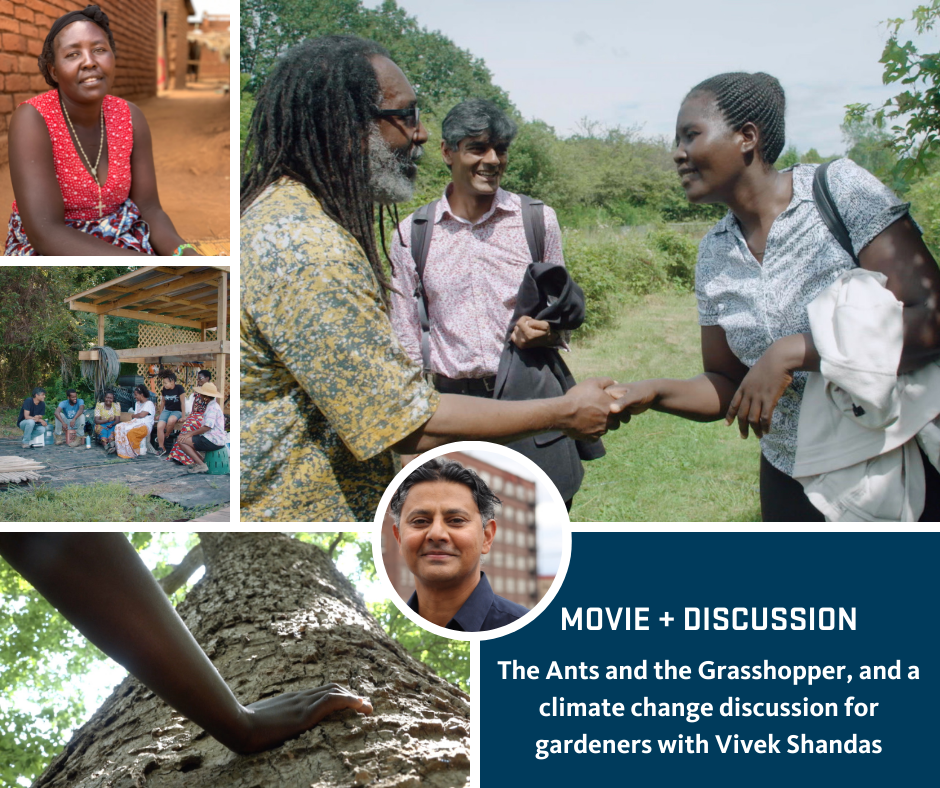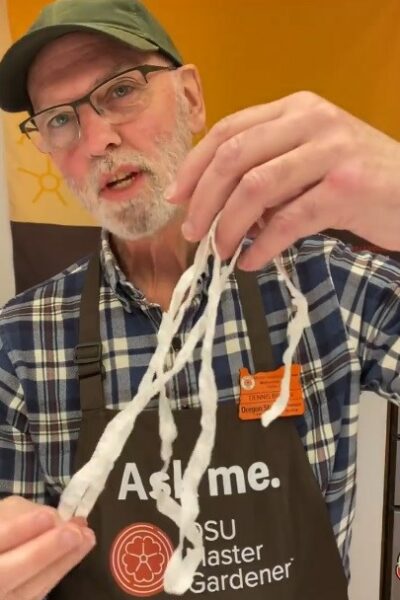Everybody can be great, because everybody can serve. […] You only need a heart full of grace.
Dr. Martin Luther King Jr.
New Year’s Greetings and Gratitude
With another year of challenges in our rear-view mirror, we extend our utmost gratitude for the on-going support and service of metro area OSU Master Gardeners. You have remained strong in your commitment to serving your community and expanding and strengthening your knowledge through continuing garden education.
In 2021, metro area Master Gardeners took part in over 3,000 hours of continuing garden education opportunities. With Oregonian’s steady demand for gardening guidance, metro area Master Gardeners answered nearly 6,000 questions via our remote helpline, virtual community events and OSU’s ‘Ask Extension’. Once again, you dug deep into your community and home gardens, and our supporting county association gardens, by growing and donating nearly 12,200 lbs. of produce to area food pantries. Despite the challenges of 2021, metro area Master Gardeners volunteered over 15,000 hours in service to your community! Kudos to one and all!
2022 Master Gardener Training
We are entering the coming year with excitement as we get ready to welcome a new Master Gardener training class. Our 2022 Master Gardener training will be a combination of online modules, webinars and outdoor hands-on workshops. Training will commence mid-February. Look to meet and welcome new trainees at Master Gardener events in the spring and summer of 2022.
OSU Martin Luther King Jr. Day of Service Events

Movie and Discussion: The Ants and the Grasshopper, and a climate change discussion for gardeners with Vivek Shandas
Gardeners in Oregon saw what climate change looks like last summer: widespread leaf scorch and leaf drop from trees, bees at risk from heat stress, and plants succumbing to a record-breaking “heat dome”. Dr. Vivek Shandas saw it too, and on the hottest day of the year he set out with his son to measure air and ground temperatures in some of Portland’s most vulnerable communities. His research on climate adaptation and climate justice shows that how people fare during extreme heatwaves is in large part dictated by where they live. Halfway around the globe, Anita Chitaya lives with climate change in Malawai, as a farmer and community activist. She traveled to America to speak with farmers, growers, community organizers, and politicians about climate change and how we can work together to reduce its rapid trajectory.
Join the OSU Master Gardener Program for the 40th anniversary of OSU’s Martin Luther King, Jr. Day of Service. Gather virtually to reflect upon environmental justice as a component to achieving social justice. We will watch the documentary that chronicles Anita Chitaya’s story, “The Ants and the Grasshopper”. Afterward, stay for a live discussion with Dr. Vivek Shandas about climate change effects on vulnerable communities, the intersection of climate change and social justice, and what role gardeners can play to promote healthier living environments for all.
‘The Ants and the Grasshopper’ Film Screening and Post Film Discussion
When: Monday, January 17, 2022, 6pm movie, 7:15 pm discussion
Where: Online, via Kinema
About the movie, The Ants and the Grasshopper : How do you change someone’s mind about the most important thing in the world? Anita Chitaya has a gift: she can change farmers’ minds about what to grow, she can change what people love to eat, and she can even persuade men to fight for gender equality. Now, to save her home in Malawi from extreme weather, she faces her greatest challenge: persuading Americans that climate change is real.
About Dr. Vivek Shandas: Vivek Shandas is a Professor in the College of Urban and Public Affairs at Portland State University. His work focuses on developing strategies for addressing the implications of climate change on cities. His teaching and research examine the intersection of exposure to climate-induced events, governance processes, and planning mechanisms. As the Founder and Director of the Sustaining Urban Places Research (SUPR) laboratory at PSU, he brings a policy-relevant approach to research, including the evaluation of environmental stressors on human health, developing of indicators and tools to improve decision making, and the construction of frameworks to guide the growth of urban regions. Over the past several years, research from the SUPR Lab has appeared in the Smithsonian Magazine, National Public Radio, Washington Post, Minnesota Public Broadcasting, NY Times, Qatar Times, and several other national and international media.
About this event: The OSU Extension Master Gardener program is sponsoring this event as one small part of OSU’s 40th Annual Martin Luther King, Jr. Day of Celebration. This event is open to all gardeners, including Master Gardener volunteers, and is intended to provide an opportunity to reflect on Dr. King’s legacy, and our programmatic commitments to diversity, equity, and inclusion, as well as climate change.
How to access this event: Tickets are free but require registration. Once you register at Kinema you’ll be provided sign-in information from Kinema. You must view the movie and discussion through Kinema at the time this event is scheduled.
Martin Luther King Jr. Day of Service – Ways to Serve from Home
- In 2022, commit to exploring how gardeners can align to combat climate change. Here are some practical ideas for steps gardeners can take, from OSU horticulturist Brooke Edmunds
- Commit to learning how those most vulnerable to climate change intersect with that reality, and the need for environmental justice. Determine what role you can take to elevate and support the voices of impacted communities.
- Support our OSU Extension Food Hero and Grow This! program, by signing up to provide guidance and advice to participants of the Grow This! Oregon Garden Challenge. Find details in our December newsletter.
- Make seed tape or mason bee houses to donate to your local community garden or school garden. Scroll down in this newsletter to see the ‘How do I create seed tape’ video from fellow Master Gardener, Dennis Brown
- Make your vegetable garden plan to include growing fresh veggies and herbs for donation to your local food pantry
- If your Master Gardener Association hosts an annual plant sale, include plant donations to local organizations who support under-served community members. Donate garden tools and seeds to organizations who support a community garden or support gardeners in under-served communities.
Metro area Master Gardener Recognized for Service
Last month, at OSU staff’s annual Extension Service Conference, metro area Master Gardener, Rhonda Frick-Wright was presented with the OSU Extension Association ‘Ask Extension’ Volunteer of the Year award in recognition of her service answering questions via Ask Extension. Sandy Reichhuber, OSU Extension co-coordinator for Ask Extension, presented the award and stated “Not only does Rhonda know what she is talking about, she answers questions in a graceful easy-to-understand and knowledgeable way.”
Of course, we in the metro area Master Gardener program know Rhonda as a valued, generous volunteer and we are delighted that Rhonda was given a celebratory shout-out for her service educating Oregonians.
Congratulations and utmost thanks Rhonda for your committed service!
Pre-order OSU Master Gardener’s New Book
In our December Newsletter we shared the exciting news…fellow OSU Master Gardener, Elizabeth Price, has written a book ‘Native and Ornamental Conifers of the Pacific NW’ that OSU Press will be publishing in the spring of 2022.
More good news! You can now pre-order Elizabeth’s book! Use Promo Code SP22 when you order online, for 20% off and free shipping (offer expires May 15, 2022).
The book is an outcome of the outstanding conifer ID workshops Elizabeth has led over the past 10 years for the metro area MG Study Group. It will serve as such a valuable resource for anyone wanting to expand their knowledge of conifers in the Pacific NW.
New Year – Garden Plans – DIY Projects
As we embrace winter, our thoughts move towards gardening plans and ‘hope of spring’. If this year’s gardening plans include starting your own plants by seed, here are some great DIY project videos presented by fellow OSU Master Gardener, Dennis Brown.
How Do I Create Seed Tape?
How Do I Make Pots to Start Seeds?






